- Home
- Jim Kjelgaard
Two Dogs and a Horse Page 4
Two Dogs and a Horse Read online
Page 4
The dog ran until he could run no more, then slowed to a trot that shortly became a tired walk. He came to another road exactly like the one he was traveling, insofar as it consisted of two ruts separated by a grass-covered crown. The only motor vehicles that could even reach such a place were jeeps and pickups. When hunters killed a buck or bull elk that must be brought out, they drove as close to it as they could possibly get and thus marked another road. There was a maze of them, all going nowhere.
Without the vaguest idea of the proper direction, the dog followed half a dozen of these trails to blind ends and retraced his steps. The more byways he explored, the more bewildered he grew. Then, cheered by a happy thought that the truck had surely returned and would be waiting for him, he tried to find the place where he had been abandoned, but he was too thoroughly lost by now to do so.
Nor could he stop. Terror mounted as the hours passed and loneliness kept pace. He blundered into unbroken forest, shrinking from sounds he had never heard and shivering with every alien scent. He forced himself on, knowing no other way to leave this horror behind and return to his rightful home. He rested only when sheer exhaustion would let him do nothing else.
That was a month ago, and, even though the dog might have found a way out of the wilderness, he had become afraid to try. He had flung himself ecstatically toward the first human being he ran across. The man, a shepherd, saw only a wolf about to attack his flock. He shot, but fortunately, he was no marksman and the bullet did nothing except plow a bloody furrow across the dog’s shoulder. The rifle’s blast frightened the forlorn creature and the pain sent him fleeing.
The second shepherd the dog happened across, he viewed from a prudent distance, and when he was once more greeted by a blasting gun, he whirled and ran. When he scented a third shepherd, he turned away without letting himself be seen. Yearning above all else for human companionship, he had avoided men ever since. For some puzzling reason, humans had become enemies and were no longer to be trusted.
The dog had found a living of sorts. Since he had never learned to kill his own meat, he relied principally on wild berries and, on rare occasions, he had been able to gorge himself. For the most part, he was hungry all the time, although once he found the remains of a cougar-slain doe and once he came face to face with a snarling lynx that had just killed a rabbit. The dog was ready to flee until the lynx, astonishingly enough, abandoned his kill and whirled to streak away.
Now the dog studied the crippled gander with wistful eyes and yearning heart. If he could not or dared not find a human being for a companion, he would accept any other nonaggressive substitute and there had been a flock of geese on the farm. Although they had never been especially friendly, neither were they enemies and, in the crippled gander, the dog saw his first positive link with home.
He watched until the wild goose ate his fill and swam back to hide in the tules. Then, rising, he walked slowly to the lake. He cast back and forth until he caught the scent of the hiding gander, then lay down with his head on his paws.
Somehow he must strike up a friendship.
* * *
When the crippled gander went back to the rushes, he followed a safety pattern which he had worked out for himself. He was in danger as long as he stayed on the open lake, but he could not leave until his wing mended and he must eat. But his feeding period could be pared to the barest minimum and the rest of the time he would hide.
He did not return to last night’s hiding place. It might have been marked and could now be an ambush, but, again, he sought the very thickest of the tules. Once there, he rested his head on his unhurt wing and moved only as much as that motion harmonized with the moving water and the wind-rustled bulrushes. Much of the time, he was awake and alert, and when he napped, it was slumber so light that the least suspicious noise or motion brought him instantly awake.
He knew at once when the dog came and settled himself at the edge of the tules, but he did not move. The gander had long since learned that panic is folly, and that doing anything at all until one knows exactly what should be done is not wise. Although the dog was scarcely eight feet away, there was no evidence that he had seen the gander and certainly no indication of hostile intentions. Even if there had been, the wild goose had little to fear.
Man was not the only enemy and this was by no means the gander’s first encounter with a wolf. He knew the capabilities of predators as thoroughly as he knew the range of a shotgun. Undoubtedly wolves were supreme on land, but, compared with the wild goose, they were fools in the water. If there should be an attack, the gander could easily glide out of the tules while the wolf was crashing through them. Once on open water, he would be safe enough.
After a few minutes, with the dog not only making no move to attack but none of any kind, the gander relaxed. He curled his head back on his wing, fully alert but expecting nothing. Hunting wolves were not in the habit of lying down so near anything at all if they were interested in catching it.
When twenty minutes passed and the dog made no discernible move, he became a part of things that would bear watching but not necessarily constant scrutiny. The gander napped. Then the dog got up, voiced a doleful little whine and splashed in the water.
The gander’s head shot up on a snakey neck. His eyes were bright and searching and his body poised for flight, but he remained still. He had plenty of time and he did not think there would be an attack. If there were, whatever moved so slowly and clumsily was nothing to fear. The wild goose was suddenly curious.
He knew now that it was not a wolf, but something else, that faced him. If it was an enemy he had never seen before, now was the time to study and analyze it so he would be ready when the next one came. If it was no enemy, what could it be?
There sounded a noisy lapping as the dog drank, then a muffled grunt as he lay down in exactly the same place where he had been lying. The gander wondered more and worried less. The longer the dog stayed near, and through his actions disclosed his nature, the less dangerous he seemed.
The next time the wild goose went to feed, the dog had ceased to be an important factor. He was there, but only as one among many things. Although he would still bear watching, it was no longer a reason for concern. The gander ate his fill and went back to the tules, seeking a place some distance from the one he had left.
A short time later, the dog found him again and lay down on the lake shore, as near as he could comfortably get.
* * *
Within three days, the gander had not only accepted the dog as a part of things, but he would have been disturbed if the animal went away. Whenever he returned from feeding, the dog invariably found him and stayed as close as possible until it was again time to feed. He never entered the water. Like all high-country lakes, it was cold. The wild goose was too well insulated to feel it, but it made the dog uncomfortable.
The gander had long since satisfied himself that ordinary precautions for his safety were sufficient and there was no need for extraordinary alertness. Since there had been no hostile move for three days, it was unlikely that there would be any. But, although the wild goose remained at ease as long as he had the open lake before him and the way into it clear, he wanted no acquaintance closer than the one he already had. Seven feet of tules was the least he would tolerate between the dog and himself.
As long as he had that much, the gander was not only satisfied but rather liked the strange relationship. He was gregarious, a bird that must have a family or be of the flock. He was never created to live alone. Since coming to the lake, he had known nothing except loneliness. If the mallard hens would have accepted him, he would have wanted none of them and the darting coots were even less suitable companions. Although the dog was necessarily more alien than anything at all that wore feathers, he still filled, at least in some part, an emptiness that had never afflicted the gander until he found himself alone. Perhaps the dog’s almost feverish desire for friendship was sensed and was not without its influence.
The gander
knew only that he felt easier by night and more comfortable by day because the dog was there. Formerly, every other living creature on this cold lake must be either an enemy or a nonentity. Anything the wild goose could not overlook he must be ready to foil or fight. He found peace in the very fact that he dared not overlook the dog, yet had no reason to foil or any wish to fight him. If it was a poor substitute for the company he would like to have, it was vastly better than nothing at all.
As the third day drew toward a close, the gander, as usual, ate his fill as swiftly as possible and swam back to the tules. He chose a thicket two hundred yards from the one he had previously occupied and held very still . . . but remained very nervous, until the dog came and lay down on the lake shore.
Reassured, the wild goose let himself nap. It was not a deep or sodden slumber for, even if he would, he could not have slept in such a fashion. All the senses that had kept him alive throughout four danger-laden years were alert and receptive. But not even the gander was capable of detecting the hunter that stalked him this night.
While the bird fed, an otter, hiding in the tules on the opposite side of the lake, had watched him. A veteran of vast experience and such great talent that he almost never failed, the otter plotted his plans with admirable craft.
Having hunted wild geese before, he knew the mettle of his quarry and waited in the tules until darkness hid him. Then he struck out across the lake, his goal the place where he had seen the gander go into the tules. He pinpointed his target with micrometer precision.
From the very start, he swam gently, his head alone breaking water and the curling V-wake that streamed behind him less noticeable than that which might mark the path of a muskrat. Fifty yards from the tules, he dived, and, so thoroughly had he mastered this style of hunting, that he was guiltless of the least error. The gander first learned of his presence when the otter came up beneath him and took a firm grip with bulldog jaws.
Surprised, but not panicky, the gander fought for his life. Beating it with his wing, he swivelled his neck and hammered his attacker with his bill. The otter closed his eyes and hung on, knowing the game was as good as won and that he needed only to wait for a killing stroke.
The two were so fiercely intent on each other that neither was aware of the dog until he stood beside them. The otter turned from the gander to meet this surprise attack. Finding himself hopelessly outclassed, he did the sensible thing and swam away.
The furious bird was half-raised on the water, ready to meet another attack if one came. He turned to find the dog at his side and was neither alarmed nor surprised. Somehow, he had expected his companion to be there. When the dog went back to the lake shore, the gander slept in the tules, only inches away.
The next morning, when the wild goose went to feed, he discovered that the most-feared of any possibility had become stark reality.
Johnny Warner, caretaker at Ravenswing Lodge in winter and handy man the rest of the time, knew dudes too well to loan support to the theory that they’ll believe anything they’re told, but not well enough to understand why they’ll sometimes accept as purest gospel that which they haven’t been told. Half the regular clients of Ravenswing were willing to swear that Johnny’s shriveled right leg and crooked spine were the aftermath of losing an argument with a peevish grizzly. The story had never come from Johnny.
However, neither had he ever resorted to convincing vehemence to brand the tale a lie. Glamour was one of the sturdiest pillars that upheld Ravenswing’s prosperity, and Johnny was a loyal employee. Actually, he’d been crippled in a routine highway accident.
Before that, Johnny had walked tall and easy among the acknowledged cream of the top guides, probably the world’s most exclusive society, even though its doors will open to any doer of deeds—if the deeds are authentic, were done in the field, and will endure favorable comparison with the more astounding achievements ascribed to the heroes of legend. It had been a fine life. But it was all in the past, along with the record bull Johnny got on Slag Mountain. That past was now as dead as the bull. However, although guiding was forever behind, the present was not all black for Johnny. It was no more than slightly shaded in places. So, rather than dwell on his calamities, he counted his blessings.
If he was no longer able to top off the horses he once rode, he could still get aboard Adolph Hitler, the bony mule who was gentleness personified with Johnny but yielded not even to his namesake in destructive aspirations toward the rest of the world. Johnny not only liked his job but he would have refused to make any change for ten times his wages, if that meant leaving the wild country. He had a good life, a good living, a considerate employer, and, on free days, he could always saddle Adolph Hitler and visit Lost Lake.
It was eight miles as the homing bee flies from Ravenswing, a puny little jaunt compared with some Johnny had taken but an unfailing adventure. Ravenswing, if one stretched a point, was civilization. But, in the direction of Lost Lake, it was civilization that terminated the second one entered the forest. Johnny was one of the few people who went there at all, and the only regular visitor. Other natives who might have shared it with him were too busy guiding Ravenswing’s dudes to spare the time—and the dudes wanted their fishing one of two ways. They’d either sit on Ravenswing’s porch and dangle hopeful lines in the little stream that rippled past it, or they’d settle for nothing less than “away back in.” A mere eight miles was not back in.
Thus Johnny had the lake and the ride from and to Ravenswing almost to himself, and he loved everything about it. The elk he surprised at their early morning or late evening quests for water were as truly elk as any he’d seen in wilderness so deep that his were the only man’s tracks there. The mule deer showed no signs of bowing to Communism or any other corruption. The rabbits, foxes, coyotes—even the mosquitoes—went about their affairs precisely as they had a thousand years ago and would, Johnny hoped, a thousand years hence. Admittedly, there was better fishing. Lost Lake did not produce the monster trout found elsewhere. But the fishing suited Johnny and it was only an anticlimax, anyhow. He rode to Lost Lake because it was like riding back into the life he had known.
Adolph Hitler had brought Johnny here so many times that a bridle and reins were almost superfluous. Of his own accord, he turned aside while a thick hedge of young evergreens stood between them and the lake. He stood patiently while Johnny unsaddled him and exchanged his bridle for a halter and picket rope. Then Adolph grabbed a mouthful of grass and solemnly chewed it. With the trip out, the trip back, and nothing to do in between except eat and rest, Adolph approved of Lost Lake, too.
Johnny hobbled toward the lake. Lacking a better explanation for the tense anticipation that always seized him at this point, he told himself he was getting old and, if there was another reason, the dickens with it anyhow! When he could feel as he did now, he would not probe for reasons. All at the same time this next step was stark drama, tense adventure and exquisite pleasure.
The hundred and some previous times he had visited Lost Lake bore no relation whatever to this time. Johnny’s eyes were not the blind—those of some people with 20-20 vision are so—eyes of one who defines monotony as the fourth or fifth time he beholds the same image. Johnny saw the lake as its Designer had intended it to be seen. Even though its physical proportions and surroundings must necessarily maintain a certain rigidity, they were merely the old frame for a constantly new picture.
When the shielding evergreens ended at a treeless little slope that washed its feet in the lake, Johnny dropped to all fours and crawled down a gulley that let him reach the lake unseen. If he had never taken such pains when trying to maneuver some hunter within range of a choice buck or bull, he had never had such reason. Johnny lived to see, but never frighten, whatever was on Lost Lake now and had not been there the last time.
The gulley ended at the tules, which, at this point, were dense enough to conceal a man but only four feet wide. Moving his body not at all and his head only as much as necessary, Johnny squi
nted through apertures where the rushes parted enough to give him a view of the lake. Suddenly, he quivered, as though from shock, then froze into rigid stillness.
On the far side of the lake, a little way out from the tules, a mighty gander was feeding. Johnny fixed bewitched eyes upon it. He knew the wild geese and their ways as well as some of Ravenswing’s dudes knew their medicine or law, and he loved them a tiny bit more than he loved everything else in the wilderness. Above anything else, wild geese were the tangible expression of the wilderness spirit.
Johnny’s eyes missed nothing and his heart told him what no eyes can see. Wild geese never lived on Lost Lake and there was only one reason why the gander was here. He’d been hurt and couldn’t fly.
Johnny’s eyes grew big with understanding and agony gripped his heart. He saw a kindred spirit, a fellow mortal, which he understood as he had never before understood anything. He too knew what it was to be hurt. He felt an almost desperate compulsion to make the crippled gander know how that had been, and what had come of it.
Then the gander saw him and hid in the bulrushes.
* * *
Even though the dog thought much about his old life, and yearned toward it as much as ever, it was obvious that the old life was no more and would not be again. The hostile shepherds who thought he was a wolf had driven a wedge of fear between him and all humanity.
Since he could not have what he most wanted, the dog made the most of what he had. Denied a return to old ways, as long as the gander remained his friend, he would adapt himself to the new.
As a pupil of the most stern and demanding teacher, he had already learned much. Although any self-respecting coyote would sneer at his efforts and lack of skill, experience had guided him to the meadow paths and forest runways where stupid, blundering and headstrong game proved as satisfactorily edible as any other kind when it was ambushed or caught. By no means was it a horn of plenty. The dog was still gaunt and still looked to other than meat for much of his food, but he had enlarged his sources. In addition to wild fruits, he had discovered that certain roots, bulbs, and even shoots of tender grass, are nourishing, though rather impalatable. He had learned that dead fish invariably float up against the outer rim of tules and may be retrieved by anything willing to swim for its dinner.

 The Lost Wagon
The Lost Wagon The Spell of the White Sturgeon
The Spell of the White Sturgeon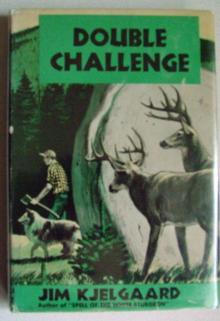 Double Challenge
Double Challenge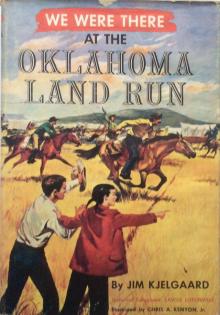 We Were There at the Oklahoma Land Run
We Were There at the Oklahoma Land Run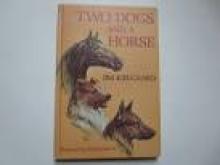 Two Dogs and a Horse
Two Dogs and a Horse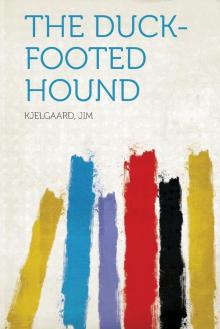 The Duck-footed Hound
The Duck-footed Hound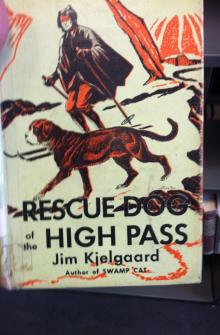 Rescue Dog of the High Pass
Rescue Dog of the High Pass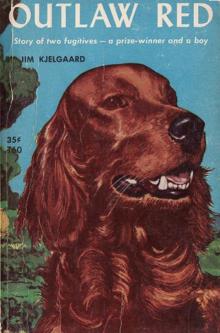 Outlaw Red
Outlaw Red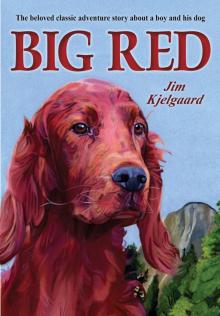 Big Red
Big Red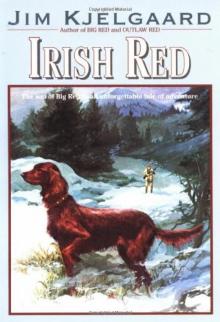 Irish Red
Irish Red